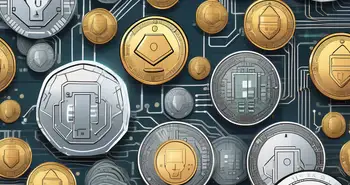Crypto Tokens vs Coins: Understanding the Key Differences and Their Uses

Cryptocurrency has taken the financial world by storm, revolutionizing the way we transact and store value. Within this vast landscape of digital assets, two terms often bring confusion: crypto tokens and coins. In this ultimate guide, I will demystify these terms and provide you with a comprehensive understanding of the differences between them. As an expert in the field, I will walk you through the basics of cryptocurrency, the role of blockchain technology, and delve into the characteristics of both crypto coins and tokens.
Understanding Cryptocurrency: A Brief Overview
To understand the differences between crypto tokens and coins, it's important to grasp the fundamentals of cryptocurrency as a whole. At its core, cryptocurrency is a decentralized form of digital currency that operates on a technology called blockchain. Unlike traditional fiat currencies, cryptocurrencies are not controlled by any central authority such as a government or a financial institution.
Cryptocurrency has gained significant popularity in recent years due to its potential for financial independence and security. The concept of decentralization means that transactions can be conducted directly between users without the need for intermediaries, resulting in lower fees and faster processing times.
The Basics of Cryptocurrency
When we talk about cryptocurrency, we are referring to a digital or virtual form of money that utilizes cryptography for secure transactions and control the creation of new units. Cryptocurrency relies on a decentralized network of computers, known as nodes, that validate and record transactions on the blockchain.
One of the key features of cryptocurrency is its limited supply. For example, the total supply of Bitcoin is capped at 21 million coins, which helps maintain its value over time. This scarcity is achieved through a process called mining, where individuals use powerful computers to solve complex mathematical puzzles to validate transactions and create new coins.
The Role of Blockchain Technology
Blockchain technology is the underlying system that powers cryptocurrencies. It is essentially a decentralized digital ledger that records transactions across multiple computers or nodes. Each transaction is grouped into a block, which is then added to the chain in a sequential and immutable manner. This technology ensures transparency, security, and resistance to fraud.
Furthermore, blockchain technology has applications beyond cryptocurrency, such as in supply chain management, voting systems, and digital identity verification. Its decentralized nature and cryptographic security make it a versatile tool for ensuring trust and transparency in various industries.
Defining Crypto Coins
Now that we have a solid foundation of cryptocurrency, let's focus on crypto coins. Crypto coins, often referred to as cryptocurrencies or altcoins, are digital currencies that operate independently of any external platform or network. Examples of popular crypto coins include Bitcoin, Ethereum, and Litecoin.
Characteristics of Crypto Coins
Crypto coins possess several key characteristics that set them apart. First and foremost, they have their own dedicated blockchain network, which means they have complete control over their protocol and governance. Additionally, crypto coins are often used as a medium of exchange, just like traditional money. These coins typically have a limited supply and can be mined or earned through various methods, depending on the specific coin.
Popular Types of Crypto Coins
There is a wide array of crypto coins available in the market, each with its own unique features and use cases. Bitcoin, the first-ever cryptocurrency, is widely recognized and widely accepted as a store of value and a means of exchange. Ethereum, on the other hand, is more than just a currency; it is a platform that enables the creation of smart contracts and decentralized applications (DApps). Other popular coins include Ripple, Bitcoin Cash, and Cardano, each with its own distinct purpose and value proposition.
Exploring Crypto Tokens
Now, let's dive into the world of crypto tokens. While coins operate independently, tokens rely on existing blockchain platforms to function. These platforms, such as Ethereum or Binance Smart Chain, provide a framework for creating and managing tokens.
Understanding What Crypto Tokens Are
Crypto tokens represent a digital asset or utility within a specific ecosystem or project. They are created and distributed through an Initial Coin Offering (ICO) or a Token Generation Event (TGE). Unlike coins, tokens do not have their own dedicated blockchain but instead leverage the infrastructure of an existing platform.
Different Types of Crypto Tokens
There are various types of crypto tokens, each serving a specific purpose. Utility tokens, for example, provide access to a product or service within a given platform. Security tokens, on the other hand, represent ownership in a tangible asset, such as real estate or company shares. Finally, there are governance tokens, which grant holders voting rights in decision-making processes within a project or community.
Key Differences Between Crypto Tokens and Coins
Now that we have a solid understanding of crypto tokens and coins, let's examine the key differences between them.
Functional Differences
One significant difference lies in the functionalities they offer. Crypto coins primarily serve as a digital medium of exchange, much like traditional money. They can be used to buy goods and services, transfer value, or store wealth. On the other hand, crypto tokens have a more varied functionality, ranging from accessing specific services and products to representing ownership or even voting rights. Tokens are an integral part of decentralized applications and innovative blockchain projects.
Value and Utility Differences
When it comes to value and utility, crypto coins are often considered a store of value or an investment asset. Their value is determined by factors such as market demand, scarcity, and their overall adoption. On the contrary, the value of crypto tokens is derived from their underlying project's success and utility within its ecosystem. The more useful and in-demand the project or platform, the more valuable its tokens become.
How to Choose Between Crypto Tokens and Coins
Now that we have explored the differences between crypto tokens and coins, you might be wondering which one is right for you. The decision ultimately depends on your specific goals and needs.
Factors to Consider
When choosing between crypto tokens and coins, consider the purpose you intend to use them for. If you are looking for a straightforward medium of exchange or a long-term investment, crypto coins may be your best bet. On the other hand, if you are interested in participating in a specific project's ecosystem or accessing certain services, crypto tokens might be more suitable.
Risk and Reward Analysis
As with any investment or financial decision, it is important to conduct thorough research and analysis. Evaluate the project's team, technology, roadmap, and community to gauge its potential for success. Understand the risks involved and only invest what you can afford to lose. Cryptocurrency markets can be volatile, so it is crucial to invest responsibly and diversify your portfolio.
Personal Advice: As an expert in cryptocurrency, I would like to emphasize the importance of staying informed and continuously learning. The crypto space evolves rapidly, and new projects and opportunities arise regularly. It is essential to stay up to date with market trends, technological advancements, and regulatory changes.
FAQ
What is cryptocurrency?
Cryptocurrency is a decentralized form of digital currency that uses cryptography for secure transactions and operates on a technology called blockchain.
How do crypto coins differ from crypto tokens?
Crypto coins have their own dedicated blockchain network and operate independently, while crypto tokens rely on existing blockchain platforms and serve specific purposes within an ecosystem.
What are the main characteristics of crypto coins?
Crypto coins have control over their protocol and governance, can be used as a medium of exchange, and often have a limited supply.
What are some examples of popular crypto coins?
Bitcoin, Ethereum, Litecoin, Ripple, Bitcoin Cash, and Cardano are some well-known crypto coins.
What are crypto tokens used for?
Crypto tokens can provide access to specific services or products, represent ownership in tangible assets, or grant voting rights within a project or community.
Which should I choose, crypto tokens or coins?
The choice depends on your goals and needs. Consider the purpose you intend to use them for and conduct thorough research before making any decisions.
What should I be aware of when investing in crypto assets?
Investing in crypto assets carries risks. Conduct proper research, understand the project's fundamentals, and only invest what you can afford to lose. Diversification and responsible investing are key in the crypto market.
With this comprehensive guide, you are now equipped with the knowledge to navigate the exciting world of crypto tokens and coins. Whether you choose to invest, participate in a project's ecosystem, or simply broaden your understanding, remember to approach cryptocurrency with an open mind, a thirst for knowledge, and a prudent approach. Happy exploring!
Ready to put your newfound knowledge of crypto tokens and coins into action? Look no further than Morpher, the revolutionary trading platform that's changing the game with zero fees, infinite liquidity, and a unique trading experience tailored for the modern investor. Whether you're interested in stocks, cryptocurrencies, forex, or even niche markets, Morpher's blockchain-based platform allows for fractional investing, short selling, and up to 10x leverage to maximize your trading strategies. Sign up today and take control of your investments with the safety of the Morpher Wallet. Don't miss out on your chance to transform how you trade – Sign Up and Get Your Free Sign Up Bonus now!

Disclaimer: All investments involve risk, and the past performance of a security, industry, sector, market, financial product, trading strategy, or individual’s trading does not guarantee future results or returns. Investors are fully responsible for any investment decisions they make. Such decisions should be based solely on an evaluation of their financial circumstances, investment objectives, risk tolerance, and liquidity needs. This post does not constitute investment advice.

Painless trading for everyone
Hundreds of markets all in one place - Apple, Bitcoin, Gold, Watches, NFTs, Sneakers and so much more.

Painless trading for everyone
Hundreds of markets all in one place - Apple, Bitcoin, Gold, Watches, NFTs, Sneakers and so much more.









